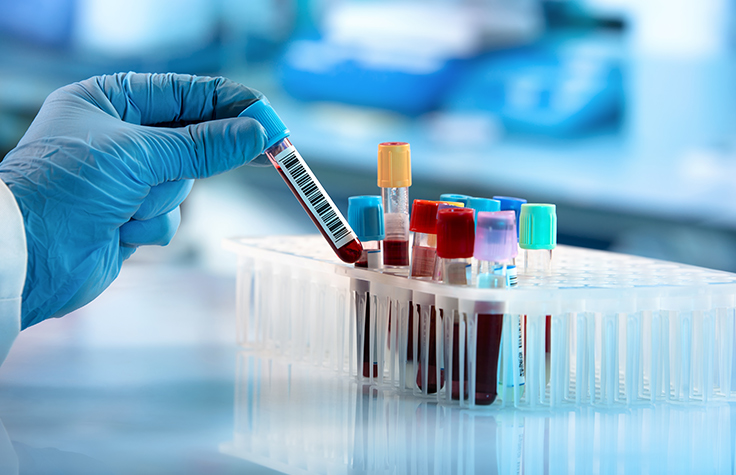Genetic & Rare Diseases
Empowering early discovery and intervention
We’re dedicated to improving the path to diagnosis for families affected by genetic and rare diseases
Advancing genetic disease testing
Next-generation sequencing technology is helping to drive breakthroughs in genetic disease testing by facilitating identification of disease-causing genetic variants. We recognize the significant impact of genetic and rare diseases on families worldwide, and we’re developing solutions to facilitate early detection and intervention. A genetic diagnosis can help improve outcomes, promote enduring good health, and raise awareness about the importance of genetics in health care.
Genetic disorders and congenital anomalies are primary contributors of hospitalization and mortality in infants.1 At least 39% of rare diseases have an identifiable genetic etiology.2 For adults, 25% of sudden cardiac arrest is due to an inherited genetic condition.3,4
"350 million people worldwide have an undiagnosed disease. I want each and every one of them to find an answer."
Genetic Testing for Rare Diseases
2–6% of the population worldwide is affected by a rare disease.5,6 80% of these rare diseases have a genetic component,7 but many patients struggle for years to receive a diagnosis. We are committed to ending these diagnostic odysseys by better understanding the genomics of rare disease.
Cardiovascular Genomics
Sudden cardiac arrest is one of the leading causes of nontraumatic mortality in the US. Cardiovascular genomics research has identified many genetic variants associated with cardiac conditions.
Neurogenetics
Genomic research has uncovered genes linked to Alzheimer's disease, multiple sclerosis, Huntington's disease, and Parkinson's disease. Today, neurogenetics and neurogenomics are significant contributors to how we understand the biology of neurodegeneration.

Solutions for genetic and rare diseases
Explore complete Illumina NGS solutions including sequencing systems, library prep, analysis, and interpretation.
Download BrochureGenetic Disease Testing Stories

Ending the diagnostic odyssey
Whole-genome sequencing for rare genetic disease can lead to a diagnosis in days, potentially helping parents avoid months or years of inconclusive tests. Listen to Dr. Vandana Shashi of Duke University and Kimberly LeBlanc of the Undiagnosed Diseases Network discuss how sequencing can shorten the diagnostic odyssey for patients with rare disease.

One assay for endless possibilities
Future-proof your tests and harness the latest genomic discoveries using flexible and dynamic virtual panels.

Comprehensive next-generation sequencing promotes efficiencies in rare disease analysis
Whole-genome sequencing (WGS) and whole-exome sequencing (WES) offer higher diagnostic utility than chromosomal microarrays. 8 Learn how WGS and WES can create a comprehensive assay, amenable to the latest genomic discoveries, and new findings can be incorporated into existing workflows.
Download BrochurePrecision health
Personalized medicine programs can help match patients to treatments, reduce disease burden, increase survival rates, and reduce the cost of care.
Learn More
References
- Farnaes L, Hildreth A, Sweeney NM, et al. Rapid whole-genome sequencing decreases infant morbidity and cost of hospitalization. NPJ Genom Med. 2018;3:10.
- Hartley T, Lemire G, Kernohan KD, Howley HE, Adams DR, Boycott KM. New diagnostic approaches for undiagnosed rare genetic diseases. Annu Rev Genomics Hum Genet. 2020;21:351-372. doi:10.1146/annurev-genom-083118-015345.
- Deo R, Albert CM. Epidemiology and genetics of sudden cardiac death. Circulation. 2012;125(4):620-637.
- Ackerman MJ, Priori SG, Willems S, Berul C, Brugada R, et al. HRS/EHRA expert consensus statement on the state of genetic testing for the channelopathies and cardiomyopathies. Europace. 2001;13(8):1077-1109.
- Ferreira CR. The burden of rare diseases. Am J Med Genet A. 2019;179(6):885-892. doi:10.1002/ajmg.a.61124
- Walker et al. The collective impact of rare diseases in Western Australia: an estimate using a population-based cohort. Genet Med. 2017;19(5):546-552.
- Bick D, Jones M, Taylor SL, et al. Case for genome sequencing in infants and children with rare, undiagnosed or genetic diseases. Journal of Medical Genetics 2019;56:783-791
- Clark MM, Stark Z, Farnaes L, et al. Meta-analysis of the diagnostic and clinical utility of genome and exome sequencing and chromosomal microarray in children with sus¬pected diseases. NPJ Genom Med. 2018 Jul 9;3:16.